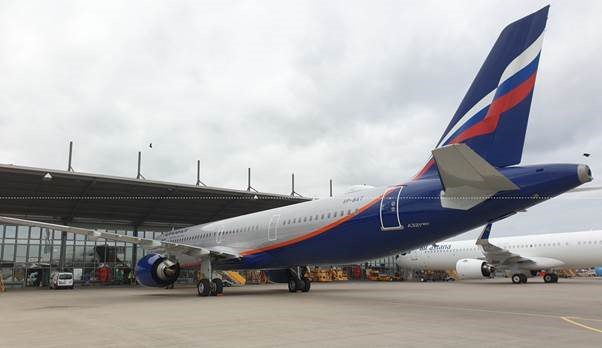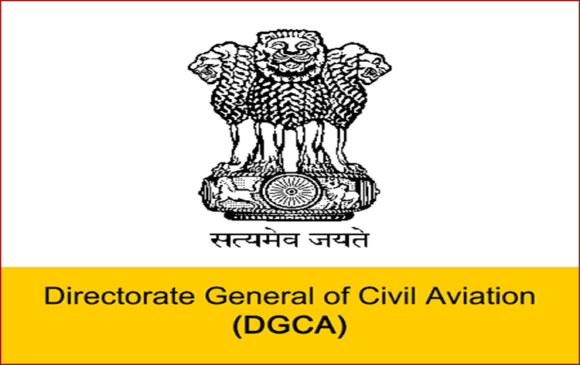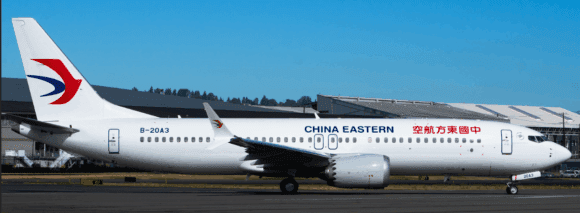
Aeroflot 22 July 2021
UPDATE February 27 – An Airbus A350-900 that departed Toulouse for Moscow on the evening of February 24 could very well have been the last new Western airliner to have joined a Russian airline for some time. With the war in Ukraine developing by the hour, the European Commission has added aircraft, spares, equipment as well as specific Russian OEMs and its management to its sanctions lists on February 24-26. Who feels the pain of Russian aircraft sanctions?
How are Russian airlines and Western OEMs exposed? When we look at the backlog of undelivered aircraft, Airbus has thirteen A350-900s to Aeroflot. Last night’s delivery – and a final payment maybe hours before Russian banks are blocked – was the ninth A350 of 22 on order.
Another one in the backlog is for fourteen A220-300s for lessor Ilyushin Finance. The order was inherited from Bombardier and originally announced as a purchase agreement in 2013. No aircraft has been placed with an airline.
UTAir features on Boeing’s list of unfilled direct orders with 28 MAX8s. Deliveries have been on hold since the grounding of the MAX in 2019. Russia is the last country that still has to recertify the MAX, but in the current geopolitical climate, this seems most unlikely now. Boeing also has six 777Fs listed for cargo operator Volga-Dnepr. It is unlikely that they can be delivered.
Lessors
Traditionally, the Russian aircraft market is dominated by lessors, both Russian state-backed banks and financing companies and leasing companies from around the globe. As the numbers for 2021 on page 10 of our database show, there are 22 of them that have Western aircraft leased to Russian airlines, of which 33 Airbus, 32 Boeing, sixteen Fokker, and one De Havilland Canada aircraft. SMBC Aviation Capital has numerous A320ceo/A321neo-family aircraft placed with airlines like Aeroflot (like the one on the main picture that was delivered last July), S7, Ural Airlines, and Nordstar.
During last week’s 2021 results webcast, Air Lease Corporation (ALC) said that it has no aircraft placed with state-owned airlines, but it does with privately-owned S7, Azur Air, iFly, Nordwind, Smartavia, and Ural Airlines. Last July, it also placed six A220-300s with Azimuth Airlines for delivery this year and in 2023. AerCap has aircraft leased to Aeroflot, Rossiya, Nordwind, Red Wings Airlines, S7, Ural Airlines, and Yamal Airlines. BOC Aviation has Aeroflot, its subsidiary Pobeda Airlines, AirBridge Cargo, and S7 as customers.
Airfinance Journal published different numbers of aircraft leased to Russian customers. According to its database, AerCap is exposed with 149 aircraft, ahead of SMBC at 34, ALC at 25, and BOC Aviation and Carlyle with 23 each.
According to the website Airfinance Journal, the second package of EU sanctions on Russia requires EU-based lessors to end their exposure of aircraft leased to Russian airlines no later than March 28, citing a briefing of international law firm Clifford Chance. This is easier said than done. For one, while many lessors have an office in the EU in Dublin, they are often part of a company that has its headquarters outside the European Union. It will be food for lawyers to determine how aircraft leased to Russian customers have been registered and where and if they are part of the sanctions. Secondly, what if Russian airlines refuse to return their aircraft, for which they will be unable to source Western spare parts and technical support now?
Engines
And then there are the engine makers. A ban on deliveries will affect Rolls-Royce (Airbus A350), General Electric/CFM (Boeing MAX and Airbus A320neo), and Pratt & Whitney (Airbus A220 and A320neo-family). A few years ago, the Trump Administration intended to block deliveries of the Pratt & Whitney GTF to Irkut and COMAC, but then made a U-turn. Russian regulators issued a basic type certificate for the Irkut MC-21 with PW1400G-JM engines in December, with more certification work to be done in the coming months. The aircraft recently completed cold-weather tests in Yakutsk.
The Irkut MC-21-300 with P&W GTF engines during recent cold-weather tests. (UAC)
It isn’t known if United Aircraft Corporation (UAC) has any GTFs in its inventory, but this seems highly unlikely. In that case, UAC will not have any engines available for the first production aircraft that were set for delivery to Rossiya this summer. Nor with it be able to take delivery of any aircraft systems from Honeywell and Collins Aerospace.
As such, more Western sanctions on Russia could derail the entry into service of the MC-21. In the worst-case scenario – for UAC and Irkut – they should wait until the -310 version with Russian-made Aviadvigatel PD-14 engines has been certified. And they should advance the development of homemade systems that they were already working on. The earlier ban on the export of composites delayed the production of wings of the MC-21 and forced UAC to source the material inside Russia and actually helped the Russian industry to become more independent.
UAC President General Yuri Slyusar, seen here doing an interview for Russian TV during last November’s Dubai Airshow, is on the UK sanctions lists. (Richard Schuurman)
UK and Australia asset freeze
The UK sanctions list of February 24 specifically mentions Russian aerospace companies Rostec, UAC, and UAC President Yuri Slyusar as part of an asset freeze, plus other companies active in the defense industry like Tactical Missles Armament Corporation. Rostec also features on the list of Australia.
Banks specifically mentioned on the list are VEB and Sberbank, who both have financed unspecified numbers of Western aircraft from Airbus and Boeing for Russian airlines and have combined orders for eight MC-21s.
Views: 9






